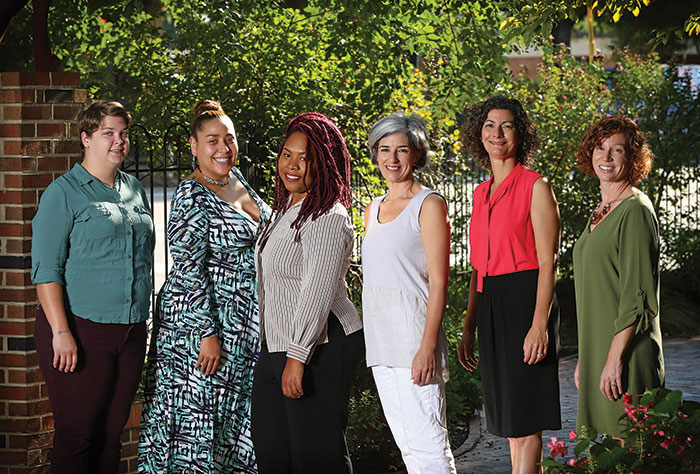Because he was bullied as a child, Jamie H. used to be afraid to ride the bus. Now the 20-year-old rides an hour each way to attend classes at Wake Tech, thanks to staff from The Hope Center who encouraged him and even accompanied him on a couple of rides.
“I was nervous about going to Wake Tech, mainly because of the busing system, but The Hope Center helped me a lot with that,” he said. “They helped me get over that fear within a matter of weeks.”
Homelessness: Nationally, 36 percent of youth with a history in foster care experience homelessness. For Hope Center participants, that number is 13 percent.
Education: Only 10 percent of young people with a history in foster care, nationally, pursue higher education, as compared to 46 percent of Hope Center participants.
Source: The Hope Center, 2015 figures
The achievement may seem small, but for the former foster youth, this longstanding fear stood in the way of his independence.
The tall young man with glasses and a shock of dark curly hair that falls over his right eye is now looking forward to a career in psychology or nursing.
“I’d be able to give back to my community for what they’ve done for me,” Jamie said. “If I were to take psychology as my career, I’d like to be a foster care specialist. That way I can be a part of the community that I was once in.
“Without The Hope Center, I feel like I might have been dead by now,” he added.
In 2009, The Hope Center at Pullen was founded by members of Pullen Memorial Baptist Church to combat homelessness in Wake County, but organizers soon realized that many of those on the streets had a history in foster care. The nonprofit narrowed its focus in 2012 to support young people aging out of the system, helping them transition to independent, productive adulthood. That year, 10 youth benefited from Hope Center programs; in 2016, close to 200 young people were helped.
“If you wrap your arms around this population, give them a lot of support, you can really make a difference in their lives,” said Jennifer Weiss, executive director.
Each young person works with Hope Center staff to create an individualized life plan, which includes goals for stable housing, education and employment.
- According to the Annie E. Casey Foundation, for every young person who ages out of foster care at 18 without support, taxpayers and communities pay an average of $300,000 in social costs such as public assistance and incarceration.
- In 2016 there were 690 children in foster care in Wake County. Between 30-40 young people age out of foster care every year in Wake County without ever finding a permanent home.
The nonprofit collaborates with government agencies, nonprofits and businesses to coordinate the necessary supportive services. Among these partners are Wake County Human Services, Wake Technical Community College, EDSI Tomorrow’s Leaders, Families Together, SAFEChild, and Triangle Family Services.
Their clients often need guidance in several areas, including employment, housing, education, parenting skills, financial management, physical and mental health, and general life skills. Hope Center staff say they can’t be experts in all these areas, so they leverage the strengths of their partners.
“We see results when we work together,” said Weiss.
Much of the Hope Center’s work begins while the young person is still in foster care. The nonprofit partners with Wake County Human Services on the LINKS program which provides academic and other support for teens in foster care. Frequent moves and a lack of a stable home can derail education, so once-a week tutoring can help children catch up at school and graduate high school on time, says Meredith Yuckman, program and volunteer coordinator at The Hope Center.
Every other week, volunteer mentors also meet with youth, and the relationship itself is the primary goal. Studies show that if a youth has three supportive, caring adults in his or her life, a host of outcomes improve.
“A lot of our youth don’t get their birthdays celebrated, period,” said Yuckman. “We had a mentor who showed up on the teen’s birthday, took her out, and spent the whole evening with her. When the girl was dropped off, she said, ‘When I woke up this morning, I didn’t even remember that it was my birthday. You have made it the best birthday ever.’”
The Hope Center’s greatest need is for volunteers willing to provide transportation or to serve as tutors and mentors. For information, email volunteer@hopecenteratpullen.org.
For more on how to support The Hope Center, visit hopecenteratpullen.org.
There is a significant problem with trust in this population, says Laura Goulian, clinical director. She and two transition specialists at The Hope Center work first to establish trust with their clients and then to offer advice.
“A lot of what we take for granted, how we raise our kids, what our kids are exposed to, or the safety net that our children have — it doesn’t exist, and this creates tremendous complications for these young people,” she said. Difficulty with interpersonal relationships is common, says Goulian. These youth may need guidance on how to interact with landlords, how to be a successful parent, and how to deal with job conflicts.
“We celebrate their accomplishments,” said Weiss. “We are so excited when they pass a probationary period in a job. To go three months in a job is a big deal for some of our young people. We walk beside them and when they stumble, we help them get up.”
Jamie has gained self-confidence and independence in the years he has worked with The Hope Center, and is especially grateful for the work skills he gained through summer internships at the Interfaith Food Shuttle and the Habitat for Humanity ReStore.
His journey hasn’t been easy, he says, admitting that he hasn’t always taken the help offered.
“It was hard enough to realize everything I was doing wrong,” he said. “But it was even harder to realize that there are people out there willing to help put you back on track, no matter what your situation.
“They see in you what you are not able to see yourself.”
The Hope Center at Pullen
1801 Hillsborough St., Raleigh
(919) 322-2751
hopecenteratpullen.org






